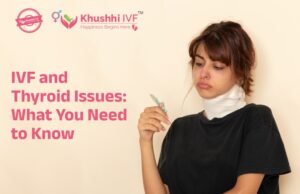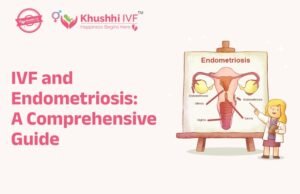Breastfeeding is one of the most natural and nurturing experiences for a mother and her baby. It provides essential nutrients, builds immunity, and strengthens the bond between mother and child. At Khushi IVF Centre, we believe in guiding families through every stage of parenthood. Whether you’re preparing for breastfeeding or dealing with challenges, our expert care at the Best IVF hospital in Ahmedabad can help.
Benefits of Breastfeeding
Breastfeeding offers unmatched health benefits for both mother and baby. For the baby, it boosts immunity, reduces the risk of infections, and enhances cognitive development. For mothers, it aids postpartum recovery and lowers the risk of certain cancers. Our leading reputed IVF doctor in Ahmedabad, Dr. Dipesh Sorathiya, emphasizes the importance of breastfeeding as part of a holistic approach to maternal and child health.
Preparing for Breastfeeding
Successful breastfeeding starts with preparation. If you’re undergoing treatment at Khushi IVF Centre, we provide comprehensive guidance during pregnancy to ensure you’re ready. Whether you’re receiving IUI treatment at an affordable price or undergoing advanced treatments like ICSI, our team supports you every step of the way.
Tips to Prepare for Breastfeeding:
- Learn the basics of latching and positioning.
- Attend infertility counseling sessions for personalized advice.
- Stay hydrated and maintain a balanced diet.
- Seek advice from our top-rated fertility specialists in Ahmedabad to manage physical and emotional well-being.
Overcoming Breastfeeding Challenges
Many new mothers face challenges like latching difficulties, low milk supply, or soreness. At Khushi IVF Centre, we offer expert support to address these issues. Our team, known for offering the best IVF and infertility treatment in Ahmedabad, works closely with lactation consultants to help mothers navigate these hurdles.
Common Breastfeeding Issues:
- Latching Problems: Proper guidance can resolve this quickly.
- Low Milk Supply: Certain foods and supplements can boost lactation.
- Sore Nipples: Use natural remedies and creams to soothe discomfort.
Breastfeeding After IVF
If you’ve undergone IVF treatment with high success rates in Ahmedabad, breastfeeding might feel even more special. Many mothers worry about whether IVF can affect their ability to breastfeed. Rest assured, with the right care and support, most IVF moms successfully breastfeed their babies.
Our clinic offers personalized advice for mothers who have undergone fertility-enhancing surgeries, embryology treatments, or procedures like vitrification for egg, sperm, or embryo freezing.
Breastfeeding for Working Moms
Returning to work doesn’t have to mean the end of breastfeeding. With proper planning, you can continue providing breast milk to your baby. At Khushi IVF Centre, we guide working mothers to balance their careers and motherhood.
Tips for Working Moms:
- Invest in a good-quality breast pump.
- Store milk safely using vitrification techniques for long-term use.
- Schedule feeding times and communicate your needs to your employer.
Role of Khushi IVF Centre in Your Parenting Journey
At Khushi IVF Centre, the most trusted IVF hospital in Ahmedabad, we understand the importance of creating a nurturing environment for your baby. Whether you’re seeking affordable fertility treatment or advanced options like preimplantation genetic testing (PGT), our team is here to guide you.
Our services, such as andrology treatment, fertility-enhancing surgeries, and low sperm count treatment in Ahmedabad, help families achieve their dreams. Once your baby arrives, we continue to support you with expert advice on breastfeeding and parenting.
Why Choose Khushi IVF Centre?
- Advanced infertility treatments in Ahmedabad: Cutting-edge technology ensures the best care.
- Affordable IVF treatment in Ahmedabad: High-quality care at reasonable costs.
- IVF success with the first cycle in Ahmedabad: Experienced specialists like Dr. Dipesh Sorathiya ensure high success rates.
- Embryo freezing in Ahmedabad: Preserve your embryos for future use with advanced techniques.
Located at SG Highway, Ahmedabad, our clinic is easily accessible for patients across Gujarat. We are proud to be the best IVF center in Ahmedabad, offering comprehensive care from conception to parenting.
A Holistic Approach to Motherhood
Breastfeeding is just one part of the parenting journey. At Khushi IVF Centre, we provide a holistic approach, from endoscopy treatment to IUI treatment at affordable prices, ensuring every parent has the tools they need.
By choosing the best IVF doctor in Gujarat, you’re not only enhancing your chances of parenthood but also ensuring a healthy future for your baby.
Conclusion
Breastfeeding is a natural way to nourish your baby and build a strong bond. With the right guidance from Khushi IVF Centre, the most experienced doctor in Ahmedabad for IVF treatment, and our supportive team, you can confidently embrace this journey. Whether you’re considering donation programs for embryos, eggs, or sperm, or need advice on fertility treatments, we’re here for you.
Let Khushi IVF Centre, the best IVF hospital in Ahmedabad, guide you through every step of parenthood. Contact us today to learn more about our services and start your journey with confidence!





